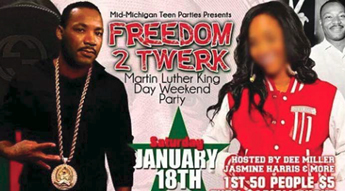
Black-oriented social media, blogs, TV and radio were ablaze over “Freedom 2 Twerk” and parties promoted to mark the Martin Luther King, Jr. Holiday.
The Twerk controversy ended with a party canceled and use of an image of Dr. King–morphed into a gold chain wearing, finger waving playa–banned. His family was rightfully upset by the indignity.
“This imagery thing is just appalling, and it’s almost embarrassing,” Dr. Bernice King, the slain civil rights leader’s daughter, told FOX 5 News. “For me, as his daughter, it’s like ‘wow,’ I lost a father who sacrificed everything for them to live a much more dignified and respectful life, and for it to come to this makes me sad.”
Additional condemnation of the misuse of Dr. King’s image followed, which was proper. When a man devotes his life to a cause and is killed pursuing that cause, he must be remembered honestly and honored for paying the ultimate price as part of his mission.
Twerkin’ in the name of Dr. King must be condemned but other things done in his name should be condemned as well.

Political and social leaders have conveniently used elements of the King message for their own purposes for far too long. Those on the right have appropriated “judged not by color of their skin but the content of their character” to justify depriving people of the very rights and opportunity for which Dr. King stood.
Other political leaders and even the president have lionized Dr. King, speaking of mountaintops and a Promised Land, without pushing policies for peace and alleviating poverty that were hallmarks of the King message before his April 4, 1968 assassination. They cite Dr. King’s message in 1963 on the Washington Mall and carefully edit it. “The Dreamer and his Dream,” they proclaim. Little White boys and girls and little Black boys and girls walking hand in hand into a racial utopia.
The 1963 speech wasn’t about a Dream; it was a critique of U.S. failures to deal with race, second class citizenship and continued denial of full rights to the children of America’s former slaves. It was looking back after the Emancipation Proclamation and saying freedom had not arrived.
“One hundred years later, the Negro is still languished in the corners of American society and finds himself an exile in his own land. And so we’ve come here today to dramatize a shameful condition,” said Dr. King.
“In a sense we’ve come to our nation’s capital to cash a check. When the architects of our republic wrote the magnificent words of the Constitution and the Declaration of Independence, they were signing a promissory note to which every American was to fall heir. This note was a promise that all men, yes, Black men as well as White men, would be guaranteed the ‘unalienable Rights’ of ‘Life, Liberty and the pursuit of Happiness.
‘ It is obvious today that America has defaulted on this promissory note, insofar as her citizens of color are concerned. Instead of honoring this sacred obligation, America has given the Negro people a bad check, a check which has come back marked ‘insufficient funds,’ ” he declared.
These strong words, too often omitted, show Dr. King as a warrior for justice and social reform, not a bleary-eyed sentimentalist. His march was a call for jobs and justice, not kumbyeyes and hymn-singing. The National Guard was activated for the 1963 March and there were fears of rioting and unrest.
Four years later, Dr. King condemned the Vietnam War and the hypocrisy of a so-called War on Poverty. He called for non-violence abroad in accord with his principle of non-violence at home.
“As I have walked among the desperate, rejected and angry young men, I have told them that Molotov cocktails and rifles would not solve their problems. I have tried to offer them my deepest compassion while maintaining my conviction that social change comes most meaningfully through non-violent action,” said Dr. King in his historic message “Beyond Vietnam: A Time to Break Silence,” delivered at Riverside Baptist Church in April 1967.
“But, they asked, what about Vietnam? They asked if our own nation wasn’t using massive doses of violence to solve its problems, to bring about the changes it wanted. Their questions hit home, and I knew that I could never again raise my voice against the violence of the oppressed in the ghettos without having first spoken clearly to the greatest purveyor of violence in the world today, my own government,” he said.
The civil rights leader’s rebuke brought condemnation and isolation from contemporary civil rights leaders, the media, politicians and White liberals. He was shot to death a year later.
Yet this side of Dr. King is omitted when his warning about U.S. militarism is more current than ever as a president’s Drones kill civilians, security agencies monitor U.S. citizens and millions remained mired in poverty and despair.
Freedom 2 Twerk is an insult to the memory and sacrifice of Dr. King, but let’s not fool ourselves. Dishonor comes in many forms.
(Final Call editor-in-chief Richard B. Muhammad can be reached at [email protected]. You can also follow him on Facebook and @RMfinalcall on Twitter.)












